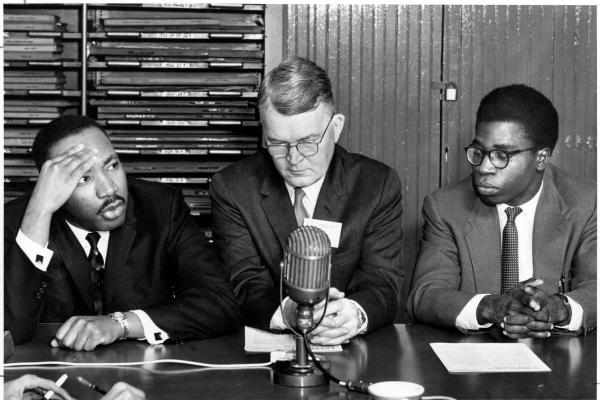On Dec. 30, 1959, over 3,000 Christian students gathered in Athens, Ohio, at the 18th Ecumenical Student Conference. Participating youth leaders and activists developed methods of engaging with social and political transformations at the turn of the 1960s. One of the key speakers was a 30-year-old Baptist preacher who emphasized a religious as well as civic prerogative for students, claiming: “whenever a crisis emerges in history, the church has a role to play.” While the specific crisis Martin Luther King Jr. referred to was the fight for civil rights in the segregated American South, he urged Christian students to challenge injustice undergirding all systemic discrimination, oppression, and racism at home and abroad.
Nearly 60 years later, the enterprise of Christian education and the role of student activism has become a growing focus of scrutiny across the United States. Christian students and religious institutions have been at the center of several public controversies in 2019. The escalation between the Covington Catholic School boys and Native American demonstrators in Washington, D.C. earlier in January called into question how race and privilege play into religious education. Earlier that month, Second Lady Karen Pence came under criticism for accepting a teaching position at a Christian school whose policy is non-accepting of LGBTQ faculty or students.
While apologists emphasize that these cases have first amendment protection, Christian academies in the South also used similar claims to bypass desegregation mandates during the mid-20th century. From 1950 to 1965, flight from public institutions into private “Christian” academies occurred at an unprecedented rate as Southern whites sought to evade the integration of public schools from the primary level all the way to the collegiate level. Several critics today point to these precedents to contest the autonomy of private institutions and call attention to the troubling outcomes from Christian education.
On social media platforms, the viral hashtag #ExposeChristianSchools has resonated with many by spotlighting miseducation, abuse, and neglect occurs from homeschool settings to Christian higher education. Numerous contributions to that online thread detail stories of “slave auction” fundraisers, discrimination against members of the LGBTQ community and people of color, corporal punishment, and being taught alternative facts (for example, that the Loch Ness Monster is real and proves that humans and dinosaurs lived at the same time). Those who shared their experiences online also expressed the desire for this public discussion to generate awareness, create a space for individuals with similar experiences, and encourage greater oversight over potentially exploitive religious institutions and practices.
Other Christians have seen this backlash as evidence that religion is under attack in the public sphere. Last week, representatives at the annual president’s conference of the Council for Christian Colleges and Universities seemed particularly concerned with the optics surrounding the recent controversies over religious institutions and affirmed their commitments to the autonomy of their private institutions. Conservative writers, bloggers, and media outlets explicitly outlined a secularist threat. Fox News and Breitbart collectively chastised #ExposeChristianSchools and those in the mainstream media for infringing on these institutions’ rights under the first amendment. Vice President Mike Pence stated that “the criticism of Christian education in America must stop."
Yet, criticism does not amount to a wholesale attack on the infrastructure of Christian education. Christian student activism in the United States has a longstanding tradition of addressing criticisms, challenging orthodoxies, and directing social change. These activists have impressed upon students of faith a duty to fight for social justice. At the ecumenical conference of 1959, Martin Luther King Jr. stood alongside other emerging leaders, including Jim Lawson and Bola Ige, who supported civil rights, progressive causes, and independence movements in the United States and across the global south.
In the 20th century, Christian students were at the forefront of organizing interdenominational, intercollegiate, and international efforts. From the early 1900s, students from public and private universities contested pervasive forms of discrimination by engaging in cooperative ecumenical ventures through a network of conferences, societies, and publications. Organizations like the Student Volunteer Movement, World Student Christian Federation, and the Young Men (and Women’s) Christian Association were all founded on these progressive aims. Adherence to these tenets prepared Christian students to engage productively both at home and in the global community.
While many of these ecumenical efforts had their own prejudices and blind spots, they inevitably evolved because of an internal willingness to continually assess their capacity to do good. By the 1960s, with the rise of university student protests, Christian students also participated in demonstrations and boycotts against racial discrimination and the Vietnam War. In 1959, the National Student Christian Federation (NSCF) was officially established and was explicitly focused on a Christian student’s duty to engage pressing social and political issues: “In light of our Christian faith and of our responsibility in a world of revolution, we feel it imperative that as Christian students we become more fully involved in the socio-political issues of our time.” The vibrancy and leadership of Christian youth was at the core of these discussions as they challenged ossified orthodoxies within U.S. Christian institutions.
Expressions of deep-rooted racism and discrimination certainly pervade the infrastructure of Christian education, but there also exists a robust tradition of challenging these positions within intercollegiate Christian organizations that have demonstrated how faith can guide progressive change. Tapping into the past, looking at how agents of justice such as King, Ige, and Lawson propelled students into greater social awareness, can help inform the future.
Got something to say about what you're reading? We value your feedback!






